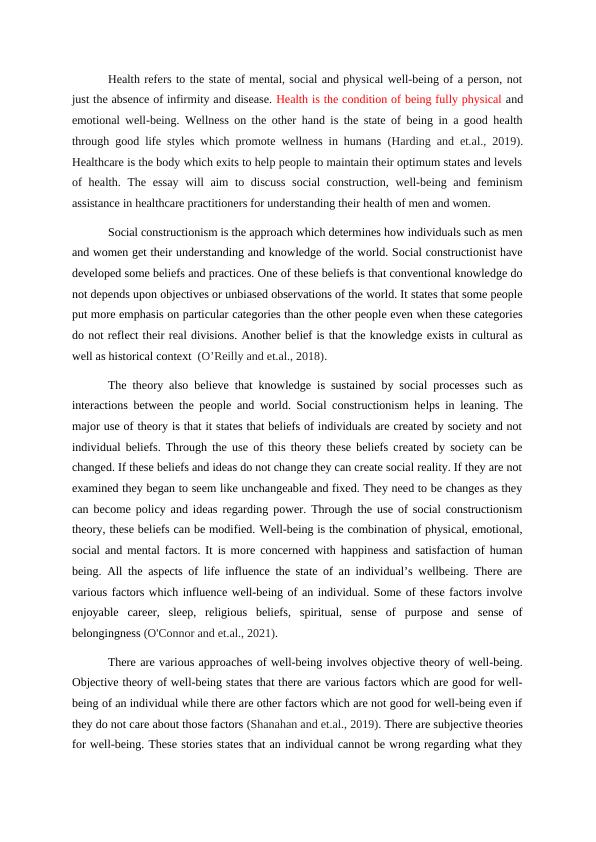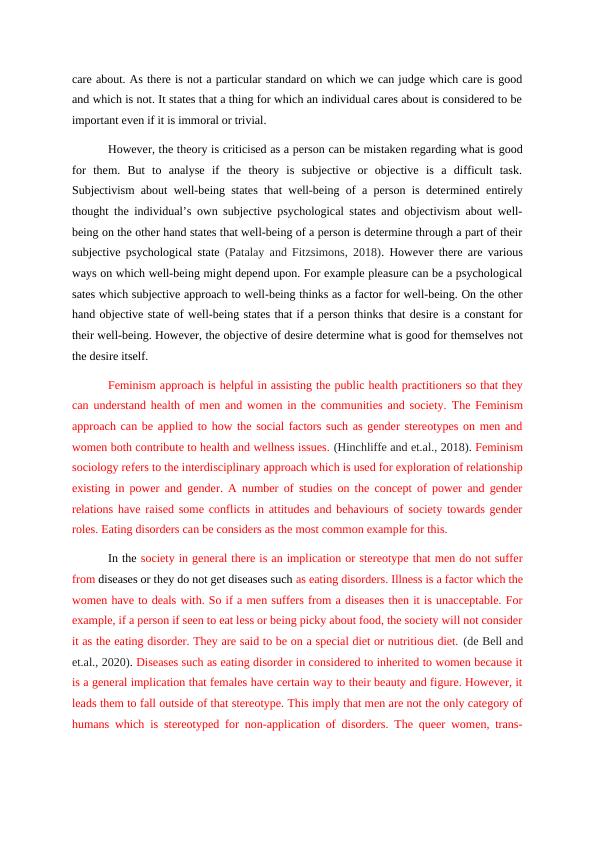Introduction to Concepts and Theories of Health
Added on 2023-06-15
7 Pages2226 Words384 Views
INTRODUCTION TO CONCEPTS AND
THEORIES OF HEALTH
THEORIES OF HEALTH

Health refers to the state of mental, social and physical well-being of a person, not
just the absence of infirmity and disease. Health is the condition of being fully physical and
emotional well-being. Wellness on the other hand is the state of being in a good health
through good life styles which promote wellness in humans (Harding and et.al., 2019).
Healthcare is the body which exits to help people to maintain their optimum states and levels
of health. The essay will aim to discuss social construction, well-being and feminism
assistance in healthcare practitioners for understanding their health of men and women.
Social constructionism is the approach which determines how individuals such as men
and women get their understanding and knowledge of the world. Social constructionist have
developed some beliefs and practices. One of these beliefs is that conventional knowledge do
not depends upon objectives or unbiased observations of the world. It states that some people
put more emphasis on particular categories than the other people even when these categories
do not reflect their real divisions. Another belief is that the knowledge exists in cultural as
well as historical context (O’Reilly and et.al., 2018).
The theory also believe that knowledge is sustained by social processes such as
interactions between the people and world. Social constructionism helps in leaning. The
major use of theory is that it states that beliefs of individuals are created by society and not
individual beliefs. Through the use of this theory these beliefs created by society can be
changed. If these beliefs and ideas do not change they can create social reality. If they are not
examined they began to seem like unchangeable and fixed. They need to be changes as they
can become policy and ideas regarding power. Through the use of social constructionism
theory, these beliefs can be modified. Well-being is the combination of physical, emotional,
social and mental factors. It is more concerned with happiness and satisfaction of human
being. All the aspects of life influence the state of an individual’s wellbeing. There are
various factors which influence well-being of an individual. Some of these factors involve
enjoyable career, sleep, religious beliefs, spiritual, sense of purpose and sense of
belongingness (O'Connor and et.al., 2021).
There are various approaches of well-being involves objective theory of well-being.
Objective theory of well-being states that there are various factors which are good for well-
being of an individual while there are other factors which are not good for well-being even if
they do not care about those factors (Shanahan and et.al., 2019). There are subjective theories
for well-being. These stories states that an individual cannot be wrong regarding what they
just the absence of infirmity and disease. Health is the condition of being fully physical and
emotional well-being. Wellness on the other hand is the state of being in a good health
through good life styles which promote wellness in humans (Harding and et.al., 2019).
Healthcare is the body which exits to help people to maintain their optimum states and levels
of health. The essay will aim to discuss social construction, well-being and feminism
assistance in healthcare practitioners for understanding their health of men and women.
Social constructionism is the approach which determines how individuals such as men
and women get their understanding and knowledge of the world. Social constructionist have
developed some beliefs and practices. One of these beliefs is that conventional knowledge do
not depends upon objectives or unbiased observations of the world. It states that some people
put more emphasis on particular categories than the other people even when these categories
do not reflect their real divisions. Another belief is that the knowledge exists in cultural as
well as historical context (O’Reilly and et.al., 2018).
The theory also believe that knowledge is sustained by social processes such as
interactions between the people and world. Social constructionism helps in leaning. The
major use of theory is that it states that beliefs of individuals are created by society and not
individual beliefs. Through the use of this theory these beliefs created by society can be
changed. If these beliefs and ideas do not change they can create social reality. If they are not
examined they began to seem like unchangeable and fixed. They need to be changes as they
can become policy and ideas regarding power. Through the use of social constructionism
theory, these beliefs can be modified. Well-being is the combination of physical, emotional,
social and mental factors. It is more concerned with happiness and satisfaction of human
being. All the aspects of life influence the state of an individual’s wellbeing. There are
various factors which influence well-being of an individual. Some of these factors involve
enjoyable career, sleep, religious beliefs, spiritual, sense of purpose and sense of
belongingness (O'Connor and et.al., 2021).
There are various approaches of well-being involves objective theory of well-being.
Objective theory of well-being states that there are various factors which are good for well-
being of an individual while there are other factors which are not good for well-being even if
they do not care about those factors (Shanahan and et.al., 2019). There are subjective theories
for well-being. These stories states that an individual cannot be wrong regarding what they

care about. As there is not a particular standard on which we can judge which care is good
and which is not. It states that a thing for which an individual cares about is considered to be
important even if it is immoral or trivial.
However, the theory is criticised as a person can be mistaken regarding what is good
for them. But to analyse if the theory is subjective or objective is a difficult task.
Subjectivism about well-being states that well-being of a person is determined entirely
thought the individual’s own subjective psychological states and objectivism about well-
being on the other hand states that well-being of a person is determine through a part of their
subjective psychological state (Patalay and Fitzsimons, 2018). However there are various
ways on which well-being might depend upon. For example pleasure can be a psychological
sates which subjective approach to well-being thinks as a factor for well-being. On the other
hand objective state of well-being states that if a person thinks that desire is a constant for
their well-being. However, the objective of desire determine what is good for themselves not
the desire itself.
Feminism approach is helpful in assisting the public health practitioners so that they
can understand health of men and women in the communities and society. The Feminism
approach can be applied to how the social factors such as gender stereotypes on men and
women both contribute to health and wellness issues. (Hinchliffe and et.al., 2018). Feminism
sociology refers to the interdisciplinary approach which is used for exploration of relationship
existing in power and gender. A number of studies on the concept of power and gender
relations have raised some conflicts in attitudes and behaviours of society towards gender
roles. Eating disorders can be considers as the most common example for this.
In the society in general there is an implication or stereotype that men do not suffer
from diseases or they do not get diseases such as eating disorders. Illness is a factor which the
women have to deals with. So if a men suffers from a diseases then it is unacceptable. For
example, if a person if seen to eat less or being picky about food, the society will not consider
it as the eating disorder. They are said to be on a special diet or nutritious diet. (de Bell and
et.al., 2020). Diseases such as eating disorder in considered to inherited to women because it
is a general implication that females have certain way to their beauty and figure. However, it
leads them to fall outside of that stereotype. This imply that men are not the only category of
humans which is stereotyped for non-application of disorders. The queer women, trans-
and which is not. It states that a thing for which an individual cares about is considered to be
important even if it is immoral or trivial.
However, the theory is criticised as a person can be mistaken regarding what is good
for them. But to analyse if the theory is subjective or objective is a difficult task.
Subjectivism about well-being states that well-being of a person is determined entirely
thought the individual’s own subjective psychological states and objectivism about well-
being on the other hand states that well-being of a person is determine through a part of their
subjective psychological state (Patalay and Fitzsimons, 2018). However there are various
ways on which well-being might depend upon. For example pleasure can be a psychological
sates which subjective approach to well-being thinks as a factor for well-being. On the other
hand objective state of well-being states that if a person thinks that desire is a constant for
their well-being. However, the objective of desire determine what is good for themselves not
the desire itself.
Feminism approach is helpful in assisting the public health practitioners so that they
can understand health of men and women in the communities and society. The Feminism
approach can be applied to how the social factors such as gender stereotypes on men and
women both contribute to health and wellness issues. (Hinchliffe and et.al., 2018). Feminism
sociology refers to the interdisciplinary approach which is used for exploration of relationship
existing in power and gender. A number of studies on the concept of power and gender
relations have raised some conflicts in attitudes and behaviours of society towards gender
roles. Eating disorders can be considers as the most common example for this.
In the society in general there is an implication or stereotype that men do not suffer
from diseases or they do not get diseases such as eating disorders. Illness is a factor which the
women have to deals with. So if a men suffers from a diseases then it is unacceptable. For
example, if a person if seen to eat less or being picky about food, the society will not consider
it as the eating disorder. They are said to be on a special diet or nutritious diet. (de Bell and
et.al., 2020). Diseases such as eating disorder in considered to inherited to women because it
is a general implication that females have certain way to their beauty and figure. However, it
leads them to fall outside of that stereotype. This imply that men are not the only category of
humans which is stereotyped for non-application of disorders. The queer women, trans-

End of preview
Want to access all the pages? Upload your documents or become a member.
Related Documents
Differences between Aboriginal concept of social and emotional wellbeing and mental healthlg...
|8
|2347
|267
Social and Emotional Well-being of Aboriginal and Torres Strait Islander Peoplelg...
|11
|3461
|439
Men's Sheds and their Impact on Health and Well-beinglg...
|9
|2700
|163
Men's Shed Intervention: Promoting Health and Well-beinglg...
|9
|2846
|149
Impact of Wellbeing on Employee Performance at Workplacelg...
|7
|1969
|373
Sociological Context and Theoretical Approaches to Health and Illness in UKlg...
|10
|804
|386
